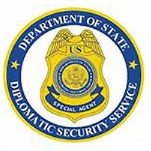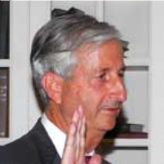Lastly, DS maintains a
responsible for transporting classified and sensitive materials overseas every year to embassies, consulates and missions. In addition to papers and files, diplomatic pouches can contain thousands of pounds of equipment and construction materials for new embassies. The courier service provides regularly scheduled classified deliveries to over 190 diplomatic posts. The $25 million program consists of a headquarters office within the Bureau of Diplomatic Security; three regional divisions in Bangkok, Frankfurt and Miami; and regional hubs at Dakar/Abidjan, Helsinki, Manama, Pretoria and Seoul.
- 3M
- American Airlines, Inc.
- American Standard Companies
- Archer Daniels Midland Company
- Ball Corporation
- Boeing Company
- Bristol-Myers Squibb Company
- CARE USA
- Chevron Corporation
- Church of Jesus Christ of Latter-Day Saints
- CIGNA
- Citigroup, Inc.
- E.I. du Pont de Nemours & Company
- Federal Mogul Corporation
- KPMG, LLP
- Lehman Brothers Holdings, Inc.
- Levi Strauss & Co.
- Merck & Co., Inc.
- Merrill Lynch & Co., Inc.
- National Football League
- The Ohio State University
- Pepperdine University
- Procter & Gamble Company
- Raytheon Company
- Ritz-Carlton Hotel Company L.L.C.
- Time Warner
- U.S. Chamber of Commerce
- Whirlpool Corporation
- U.S. Agency for International Development
- U.S. Department of Commerce
- U.S. Department of State
- U.S. Department of the Treasury
Private Security Contractors in Iraq
(CRS Report) (PDF)
Blackwater's Employment Investigated
(by Karen DeYoung, Washington Post)
State Dept. Ousts Its Chief of Security
(by Karen DeYoung, Washington Post)
- Table of Contents
- Overview
- History
- What it Does
- Where Does the Money Go
- Controversies
- Suggested Reforms
- Comments
- Leave a comment

In the wake of the murder of five American diplomats at the consulate in Benghazi, Libya, last year, the safety of diplomatic personnel serving overseas has come under increased scrutiny in Washington. Late last month, President Obama nominated Gregory B. Starr to be the next assistant secretary of state for diplomatic security (DS). This would make Starr the chief of the security and law enforcement arm of the State Department. Starr has been principal deputy assistant secretary of state for Diplomatic Security and acting assistant secretary for Diplomatic Security since February 2013.
Born February 3, 1953, in New York, Starr earned a B.A. in Political Science and a Master’s degree in Forensic Science from the George Washington University in the late 1970s.
Starr began his career as a special agent in the Foreign Service in July 1980, serving early career assignments as a regional security officer at facilities in Tunis, Tunisia; Dakar, Senegal; and Kinshasa, Democratic Republic of the Congo (then Zaire). He has also served in the secretary of state’s detail, in technical security operations, and at the New York Field Office.
From 1995 to 1997, Starr was chief of the division for worldwide local guard and residential security programs. He served his last overseas posting as senior regional security officer at the U.S. Embassy in Tel Aviv, Israel, from 1997 to 2000.
Starr then took three straight stateside assignments. From 2000 to June 2004, he was director of the Office of Physical Security Programs. From July 2004 to March 2007, he was deputy assistant secretary for countermeasures, responsible for devising security policy.
From April 2007 until his retirement in May 2009, Starr was principal deputy assistant secretary and director of the diplomatic security service. He also served as the acting assistant secretary for DS from October 2007 to July 2008 following the resignation of Richard J. Griffin in the wake of controversies regarding the killing of Iraqi civilians by private contractors.
After retiring from the Senior Foreign Service, Starr served as United Nations under-secretary-general for Safety and Security from May 2009 to January 2013.
Starr is married with two children.
-Matt Bewig
To Learn More:
Statement before the Senate Foreign Relations Committee (pdf)

- Latest News
- D.C. Public Schools will Teach all Second-Graders to Ride a Bike
- New Rule in Germany Limits Sales of Sex-Themed E-Books to 10pm to 6am
- What Happened to the 6-Year-Old Tibetan Boy the Chinese Government Kidnapped 20 Years Ago?
- U.S. Ambassador to Turkey Photoshops his Hair Color to Mock Turkish Mayor
- Mystery Artist Calls Attention to Unfixed Potholes by Drawing Penises around Them
Lastly, DS maintains a
responsible for transporting classified and sensitive materials overseas every year to embassies, consulates and missions. In addition to papers and files, diplomatic pouches can contain thousands of pounds of equipment and construction materials for new embassies. The courier service provides regularly scheduled classified deliveries to over 190 diplomatic posts. The $25 million program consists of a headquarters office within the Bureau of Diplomatic Security; three regional divisions in Bangkok, Frankfurt and Miami; and regional hubs at Dakar/Abidjan, Helsinki, Manama, Pretoria and Seoul.
- 3M
- American Airlines, Inc.
- American Standard Companies
- Archer Daniels Midland Company
- Ball Corporation
- Boeing Company
- Bristol-Myers Squibb Company
- CARE USA
- Chevron Corporation
- Church of Jesus Christ of Latter-Day Saints
- CIGNA
- Citigroup, Inc.
- E.I. du Pont de Nemours & Company
- Federal Mogul Corporation
- KPMG, LLP
- Lehman Brothers Holdings, Inc.
- Levi Strauss & Co.
- Merck & Co., Inc.
- Merrill Lynch & Co., Inc.
- National Football League
- The Ohio State University
- Pepperdine University
- Procter & Gamble Company
- Raytheon Company
- Ritz-Carlton Hotel Company L.L.C.
- Time Warner
- U.S. Chamber of Commerce
- Whirlpool Corporation
- U.S. Agency for International Development
- U.S. Department of Commerce
- U.S. Department of State
- U.S. Department of the Treasury
Private Security Contractors in Iraq
(CRS Report) (PDF)
Blackwater's Employment Investigated
(by Karen DeYoung, Washington Post)
State Dept. Ousts Its Chief of Security
(by Karen DeYoung, Washington Post)
Comments

In the wake of the murder of five American diplomats at the consulate in Benghazi, Libya, last year, the safety of diplomatic personnel serving overseas has come under increased scrutiny in Washington. Late last month, President Obama nominated Gregory B. Starr to be the next assistant secretary of state for diplomatic security (DS). This would make Starr the chief of the security and law enforcement arm of the State Department. Starr has been principal deputy assistant secretary of state for Diplomatic Security and acting assistant secretary for Diplomatic Security since February 2013.
Born February 3, 1953, in New York, Starr earned a B.A. in Political Science and a Master’s degree in Forensic Science from the George Washington University in the late 1970s.
Starr began his career as a special agent in the Foreign Service in July 1980, serving early career assignments as a regional security officer at facilities in Tunis, Tunisia; Dakar, Senegal; and Kinshasa, Democratic Republic of the Congo (then Zaire). He has also served in the secretary of state’s detail, in technical security operations, and at the New York Field Office.
From 1995 to 1997, Starr was chief of the division for worldwide local guard and residential security programs. He served his last overseas posting as senior regional security officer at the U.S. Embassy in Tel Aviv, Israel, from 1997 to 2000.
Starr then took three straight stateside assignments. From 2000 to June 2004, he was director of the Office of Physical Security Programs. From July 2004 to March 2007, he was deputy assistant secretary for countermeasures, responsible for devising security policy.
From April 2007 until his retirement in May 2009, Starr was principal deputy assistant secretary and director of the diplomatic security service. He also served as the acting assistant secretary for DS from October 2007 to July 2008 following the resignation of Richard J. Griffin in the wake of controversies regarding the killing of Iraqi civilians by private contractors.
After retiring from the Senior Foreign Service, Starr served as United Nations under-secretary-general for Safety and Security from May 2009 to January 2013.
Starr is married with two children.
-Matt Bewig
To Learn More:
Statement before the Senate Foreign Relations Committee (pdf)

- Latest News
- D.C. Public Schools will Teach all Second-Graders to Ride a Bike
- New Rule in Germany Limits Sales of Sex-Themed E-Books to 10pm to 6am
- What Happened to the 6-Year-Old Tibetan Boy the Chinese Government Kidnapped 20 Years Ago?
- U.S. Ambassador to Turkey Photoshops his Hair Color to Mock Turkish Mayor
- Mystery Artist Calls Attention to Unfixed Potholes by Drawing Penises around Them





Comments